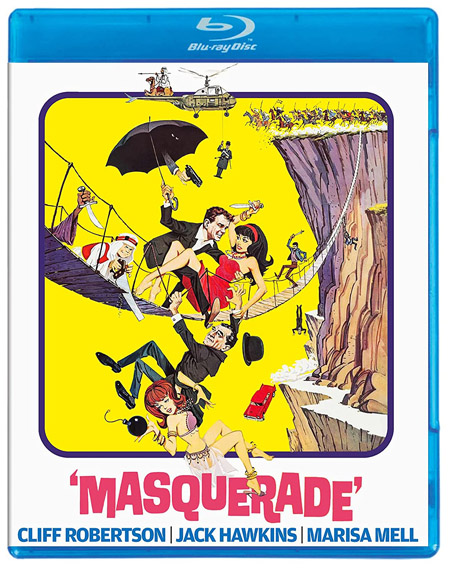
“SPIES
WITH SCRUPLESâ€
By
Raymond Benson
In
comparing Masquerade (1965) with a recent review of Arabesque (1966)
here at Cinema Retro, this time we have yet another mid-1960s “comedy-spy
thriller,†a genre that was crowding the cinemas in those days because of the
success of Double-O-You-Know-Who.
In
contrast to Arabesque, this one is a British production, directed
by the prolific and often brilliant Basil Dearden, and it utilizes London
locations as well as spots in Spain. And yet, despite the thoroughly British
DNA running through 95% of the movie, it stars American Cliff Robertson as the
hero, David Fraser, a sort of CIA type who seems to approach all the danger
around him with misplaced naivete and amused detachment.
The
script marks the first appearance of the great William Goldman in a screen
credit (co-writing with Michael Relph). It’s based on Vincent Canning’s novel, Castle
Minerva. Apparently, it was Robertson who had enlisted Goldman’s services,
as the dialogue needed some “Americanizing.†That said, the script is
serviceable and certainly makes more sense than what we saw in Arabesque.
Britain
wants oil drilling rights in a fictional Middle Eastern country, but the
country isn’t playing ball. Colonel Drexel (Jack Hawkins) is engaged by Sir
Robert (John Le Mesurier) to fix the problem. Drexel hires an old war buddy, Frazer,
to kidnap the teenage son of the country’s prince. This is supposed to force the
resumption of talks and ultimate agreement between the two countries. Why this
is considered sound diplomacy is anyone’s guess, but that’s the mission. Frazer
goes along with the plan out of loyalty to his friend; however, at one point he
rejects performing an order because he has “scruples†(but kidnapping a prince
isn’t one of them). Frazer eventually finds that he has competition in the form
of a small gang of Europeans who also want the boy. As the tag line for the
movie in its posters and theatrical trailer shouts, “Who is Doing What to Who?â€
Indeed… the audience will be wondering that, too. (Shouldn’t that be “to Whom?â€)
In other words, the movie is filled with double-crosses, switcheroos, and
things that are not as they seem.

The
picture is lively and loaded with action sequences. The supporting cast,
especially the Europeans (namely Marisa Mell and a young Michel Piccoli), are a
hoot. The British side sports familiar character actors besides Hawkins (such
as Charles Gray and Bill Fraser).
Unfortunately,
Masquerade doesn’t quite succeed as intended mainly due to the casting
of Robertson. Like Arabesque, this needed someone with the comic
delivery of a Cary Grant, and the American Robertson is also oddly out of place
in this British-European milieu. Robertson does his best, though, and he gets
the job done—even if the whole thing is more than just implausible. (The poor
guy gets clobbered on the head several times in the movie; one would think a
concussion might have debilitated him after, say, the third time.)
Kino
Lorber’s new Blu-ray displays that distinctive 1960s film stock look, and it’s
a good enough transfer. It comes with an audio commentary by film historians
Howard S. Berger and Chris Poggiali. The theatrical trailer, along with other Kino
Lorber trailers, are the only supplements.
Masquerade
is a
middle-of-the-road example of the 1960s cinematic “spy boom, and the Bond-Wanabe
aspects of the picture plants it firmly within the context of its era.
CLICK HERE TO ORDER FROM AMAZON